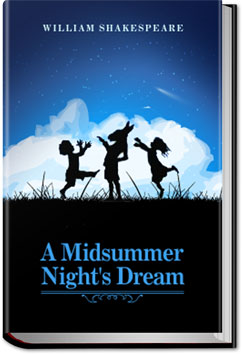Magic, fairies, young lovers chasing each other through a forest, a man with a donkey’s head, and impish Puck wreaking havoc right and left. What’s going on here? It’s A Midsummer Night’s Dream, Shakespeare at his most fanciful.
The play opens with Theseus, Duke of Athens, preparing for his wedding. Egeus complains to Theseus that his daughter Hermia refuses to marry Demetrius. When Hermia is given the choice between marriage to Demetrius or life as a nun, she and her true love Lysander flee into the forest. Demetrius follows them; and Helena, who loves Demetrius, follows him.
Also in the forest are Oberon and Titania, king and queen of the fairies, at odds with one another. At Oberon’s behest, Puck causes Demetrius to fall in love with Helena — oops, he missed, that was Lysander instead. Mayhem ensues.
In the meantime, a group of bumbling craftsmen rehearses a play. Puck gives one of them, Bottom, the head of an ass and makes Titania fall in love with him. Further hilarity results as Bottom sees nothing at all odd about this. Eventually everything is straightened out, Bottom and the rest “perform” their play, there is a triple wedding, and Puck assures us the whole thing has been a dream.
Then I must be thy lady; but I know
When thou hast stol'n away from fairy-land,
And in the shape of Corin sat all day,
Playing on pipes of corn, and versing love
To amorous Phillida. Why art thou here,
Come from the farthest steep of India,
But that, forsooth, the bouncing Amazon,
Your buskin'd mistress and your warrior love,
To Theseus must be wedded; and you come
To give their bed joy and prosperity.
OBERON
How canst thou thus, for shame, Titania,
Glance at my credit with Hippolyta,
Knowing I know thy love to Theseus?
Didst not thou lead him through the glimmering night
From Perigenia, whom he ravish'd?
And make him with fair Aegle break his faith,
With Ariadne and Antiopa?
TITANIA
These are the forgeries of jealousy:
And never, since the middle summer's spring,
Met we on hill, in dale, forest, or mead,
By pavèd fountain, or by rushy brook,
Or on the beachèd margent of the sea,
To dance our ringlets to the whistling wind,
But with thy brawls thou hast disturb'd our sport.
Therefore the winds, piping to us in vain,
As in revenge, have suck'd up from the sea
Contagious fogs; which, falling in the land,
Hath every pelting river made so proud
That they have overborne their continents:
The ox hath therefore stretch'd his yoke in vain,
The ploughman lost his sweat; and the green corn
Hath rotted ere his youth attain'd a beard:
The fold stands empty in the drownèd field,
And crows are fatted with the murrion flock;
The nine men's morris is fill'd up with mud;
And the quaint mazes in the wanton green,
For lack of tread, are undistinguishable:
The human mortals want their winter here;
No night is now with hymn or carol blest:—
Therefore the moon, the governess of floods,
Pale in her anger, washes all the


